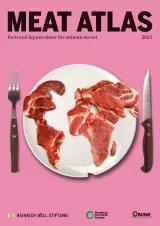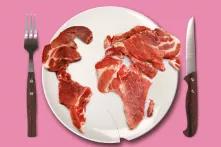
Civil society is a sometimes underestimated stakeholder in the food system. Supporting sustainable production and criticizing industrialized agriculture, it influences public opinion and habits and demands better policies and international solidarity. And it can hold governments and companies accountable for their actions, while offering solutions.

Evidence of problems related to intensive livestock farming is mounting. An increasing number of civil society organizations and activists are becoming involved in this issue, including farmers’ organizations, community groups, animal rights and welfare activists, health groups, vegan and vegetarian groups, and organizations concerned with climate and the environment. While their interests and goals differ, they all demand more sustainable and sensitive animal production, and less consumption of animal products.
Farmers’ organizations in Europe are concerned about the economics of livestock raising and the recurrent crises that have hit dairy, beef and pig farmers over the past decade. They are pushing for the transformation of the animal farming sector. The European Milk Board and the European Coordination Via Campesina, which represent thousands of farmers across the European Union, are alarmed by the drop in prices that producers are being paid. The Milk Board proposes that producers voluntarily reduce the production of milk during severe crises, and receive compensation for every litre of milk they do not produce. Via Campesina highlights the importance of revising regulation and competition rules to protect small-scale farmers. The two farmers’ organizations want processing and marketing to be re-localized to give farmers more direct contact with consumers.
Organizations promoting animal welfare and animal rights are prominent. The End the Cage Age initiative brought together over 170 organizations calling for a ban on keeping animals in cages in the EU. The campaign was supported by 1.4 million citizens, making it only the sixth European Citizens’ Initiative (a mechanism for citizens’ involvement in policymaking) to surpass 1 million signatures among the 75 such proposals in the last 8 years. It was the first successful initiative to focus on animal welfare. The European Commission must now spell out what action it will take to address the issue of cage farming.
Various initiatives at national, regional and local levels are looking for ways to deal with the negative impacts of industrial animal farming. In Spain, for example, a national platform that brings together neighbourhood movements and communities calls for a moratorium on industrial livestock. In the UK, the Eating Better Alliance comprises over 60 groups concerned about health, environment, animal welfare and social justice. It wants a 50 percent reduction in meat and dairy consumption in the UK by 2030, and a transition to “better” meat and dairy. It advocates sustainable food and farming policies, demands improvements from food businesses, and inspires people to make positive changes.
For some of these organizations, animals are part of a sustainable farming model. But some animal rights and welfare organizations, together with parts of the vegetarian and vegan movements, regard rearing animals as unethical: they say it should not happen at all. Some see a solution in meat alternatives and in lab-grown meat; others warn of the effects these would have on farming in general. They worry that people will become further disconnected from their food, that farmers will be excluded, and industrialized food manufacturing and big investors in this growing sector will come to dominate.
The sustainable meat movement is increasingly organized internationally. Intensive meat production in industrialized countries has effects elsewhere, and industrial meat production is also becoming an issue in the developing world. Calls to reduce the number of farm animals go beyond Europe, reaching countries like Brazil, Argentina and Paraguay, where activists join forces with European civil society to demand an end to unsustainable production methods. One recent campaign has opposed a trade agreement between Mercosur and the EU, which is expected to increase the production and trade of animal products and to trigger further deforestation in Latin America.
The role of livestock in emitting greenhouse gases is a focus for organizations working on the environment and climate change. These organizations see agriculture and food systems as critical elements in the crises of human rights, biodiversity and climate. They demand urgent action from policymakers across the world. Many of these organizations have come together to call on the European Commission to develop an action plan to promote less and better consumption and production of meat, dairy and eggs, to shift away from industrial farming, and to support better animal farming and healthy, plant-rich diets.


